Fall 2015 Newsletter - Miami University History Department
Chair's Welcome
 As the Winter holiday season approaches, I am delighted to send you an update on the recent work of the History Department at Miami University. This Fall we welcomed three new continuing faculty in U.S. history: Dr. Steven Conn as the new W.E. Smith Chair in American History and Drs. Lindsay Schakenbach Regele and Andrew Offenburger as assistant professors. Drs. James Coons and Brendan Gillis reinforced our ranks as visiting professors in Early-Modern European history and Early American history, respectively. We are very pleased that they have already enriched our offerings, shared their ideas, and begun to develop new courses.
As the Winter holiday season approaches, I am delighted to send you an update on the recent work of the History Department at Miami University. This Fall we welcomed three new continuing faculty in U.S. history: Dr. Steven Conn as the new W.E. Smith Chair in American History and Drs. Lindsay Schakenbach Regele and Andrew Offenburger as assistant professors. Drs. James Coons and Brendan Gillis reinforced our ranks as visiting professors in Early-Modern European history and Early American history, respectively. We are very pleased that they have already enriched our offerings, shared their ideas, and begun to develop new courses.
This Newsletter offers some glimpses into the recent work of our faculty and students. Four of the stories feature innovative classroom experiences. This semester our students drew on the personal memories of a Vietnam veteran, did research in the University Archives on Miami graduates who served in the military, sang Mexican revolutionary songs, and cooked historic Russian food. The history of food is certainly a burgeoning, not to mention appetizing, field. A group of our faculty is preparing a new, team-taught class on Food in History and our colleague Dr. Peggy Shaffer is spearheading a new Food Studies Institute. To top it up, the Miami University Humanities Center—whose work is featured in another story—is offering a year-round Altman Program on “The Senses.” A rich menu of activities allow students and faculty to engage with new scholarship on the ways in which our sensory perceptions of the world have been shaped and changed over time.
That such intellectual experiences have great dividends is something most of us have known all along. But how exactly does what students do in the classroom translate into skills that can benefit them in their future careers? This is a question that is more urgent than ever. And no one in our department has done more to raise it, and answer it, than Dr. Erik Jensen. This Fall his work on career advising for history students earned him a well-deserved University Excellence Award in Career Development. I recommend his description of his initiatives in this Newsletter.
I wish you happy holidays. Please keep in touch in the New Year!
Wietse de Boer
Chair, Department of History
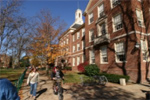
How You Can Help Current Students
Today's students are encouraged to pursue internships, study abroad, or take classes that involve traveling to a region they are studying, or to museums and archives. Others travel on their own to do research for an Honors or M.A. thesis. A contribution of any size will help these undergraduate or graduate students take advantage of these opportunities. Being able to travel to archives or attend a conference would greatly enrich their Miami education.
But we would also appreciate your engagement with our students! Do you have internship opportunities to offer students? Would you be interested in discussing with current students how you went from a satisfying Miami History major to a satisfying career? Let us know. We would be happy to bring you to campus to share your post-Miami experiences in one of our new series of career workshops!
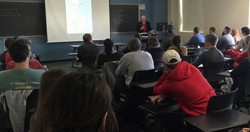
The Engaged History Classroom
This year Miami celebrates the Year of Creativity. In that spirit, this newsletter features ways that Miami History faculty members have continued to bring innovation, creativity, and dynamism to the classroom. See below for a few snapshots of ways that history is coming to life in Upham Hall.
A Vietnam Veteran Visits U.S. History Class
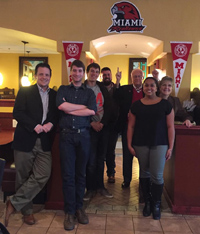 On November 9, Douglas T. Bates III and his wife, Molly, of Centerville, Tennessee, visited Dr. Andrew Offenburger’s class on post-1865 U.S. history. Bates, a veteran of the Vietnam War and a practicing lawyer, spoke with students about the colonial roots of Vietnam’s history, about his experiences in the 1960s and during the War, and about historical perspective and bias.
On November 9, Douglas T. Bates III and his wife, Molly, of Centerville, Tennessee, visited Dr. Andrew Offenburger’s class on post-1865 U.S. history. Bates, a veteran of the Vietnam War and a practicing lawyer, spoke with students about the colonial roots of Vietnam’s history, about his experiences in the 1960s and during the War, and about historical perspective and bias.
Bates was a military policeman in Vietnam and escorted shipments of armaments and goods between the coast and the interior. His convoys followed behind infantry soldiers, who were often attacked and killed along the roadside. Such service and sacrifice enabled Bates's convoy to reach its destination. “Sometimes we talk about the men and women who have died for our freedom,” he said, “but in Vietnam I could see the bodies of those who died for mine.”
Thirty years after serving, Doug and Molly returned to Vietnam in an attempt to come to peace with the War’s legacy, both personal and national. At one point, they asked their tour guide to stop so that the couple could meet local farmers. On a whim, Doug waded into a rice paddy and asked a worker if he could carry two baskets of rice with a bamboo yoke, a feat that he struggled with and that left his shoulders aching for six months. When Doug asked what one onlooker was saying to another, the translator said, “Our men are strong like elephants. He is strong like a duck.”
Doug’s humor, his passion, and his storytelling connected with students on multiple levels. Following class, he and Molly joined Dr. Offenburger, Michael Orr, Nick Herrmann, Nathan Hoch, and Laura Paprocki for lunch.
Tasting Russia
Can you taste the past? That’s a question students in Dr. Stephen Norris’s Fall 2015 class, A History of the Russian Empire (HST 374), tried to answer. 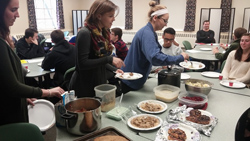
Working in groups of three, students prepared a classic 19th Century dish collected and published by Darra Goldstein in her A Taste of Russia: A Cookbook of Russian Hospitality.
Each team brought their food to class on November 12 and everyone enjoyed a feast of marinated mushrooms, Olivier’s salad, sweet and sour beets, clear fish soup, lemon soup, chicken cutlets, beef Stroganov, hussar-style beef, Guriev kasha, and the tsarina’s cream, washed down with some non-alcoholic kvas.
Each student then wrote a short reflection piece that attempted to answer the question of whether or not you could taste the past. Inspired by the Humanities Center’s 2015-2016 Altman Program “The Senses,” you can read the best reflection papers on the Havighurst Center for Russian and Post-Soviet Studies blog.
Mexican Revolutionary Ballad Singing Competition
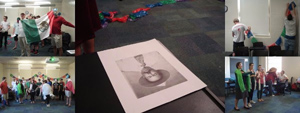 Congratulations to the students of Dr. Elena Jackson Albarrán’s HST/LAS 360T, Mexico since Independence, winners of the Semi-Annual Concurso del Corrido (Revolutionary Ballad Competition), against their competitors at St. Xavier University in Chicago. Both classes were tasked with learning and performing a revolutionary Mexican folk ballad.
Congratulations to the students of Dr. Elena Jackson Albarrán’s HST/LAS 360T, Mexico since Independence, winners of the Semi-Annual Concurso del Corrido (Revolutionary Ballad Competition), against their competitors at St. Xavier University in Chicago. Both classes were tasked with learning and performing a revolutionary Mexican folk ballad.
In class, students had studied the ways that corridos served as important pieces of social commentary and continue to form a vital part of the living oral history tradition in Mexico since the nineteenth century. On November 3, Miami students sang in honor of the moment that Pancho Villa’s memory was restored through official recognition by the Mexican government.
History senior Greg Czernik set the tone of the ballad by playing the opening salvo on his trumpet. In addition to learning the song (in Spanish), they also procured—and managed to play one sustained note on—a requisite accordion. The results were submitted to a panel of expert judges (including the author of their textbook).
Thanks to Miami students for their spirited interpretation of “Justicia a Villa,” which earned the coveted trophy a trip to its rightful home here in Oxford, OH.
Miami Veterans in the Archives
The 12 students in this fall's AMS/HST 435/535 Public History Practicum course taught by Dr. Helen Sheumaker have written over 25 biographies about Miami University students from the 19th and 20th centuries who served in the military.
Students selected individuals to research, delved into the Miami University Archives and online sources, and wrote brief life stories about men and women, infantry soldiers to chaplains to generals. The Civil War, World War I and II are represented in the biographies. Students read letters from MU President Hughes to men serving in World War I; they found medical records online; they researched farms and hospitals; reviewed Miami University yearbooks and administration memos; they deciphered a Civil War roster signed by boys heading off to fight with Professor McFarland.
The biographies can be found on the Miami University Alumni Association website.
Faculty Spotlight: Erik Jensen
Career Development for History Majors
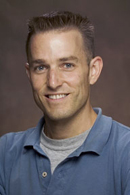
Humanities Works has been spearheaded by Tim Melley and Heather Christman (in the Career Services Office) as an initiative to bring together representatives from the humanities departments to talk about how we can integrate career planning into the advising that we provide our students. We've done a lot of brainstorming; some collaborative planning; some researching of the types of skills that we're providing our majors that are demanded by employers; and a fair amount of meeting with representatives from the public and private sector. On that last point, the members of Humanities Works took a field trip to Cincinnati on October 23 to meet with representatives from start-up companies, from arts organizations, and from the Chamber of Commerce about what they're looking for in employees.
The biggest thing that our history majors can do is to start thinking about their life after graduation and about what their goals and aspirations are. I think that a lot of our majors don't give it much thought until their senior years and then think, "What am I going to do after I graduate? What do I even want to do after I graduate?" The sooner that they can answer that last question, the sooner they can start preparing themselves for that goal, by visiting the Career Services Office and by talking to people in that field about internships, opportunities, and skills. And we're simply talking here about after graduation, not "the rest of my life." Students' goals and ambitions will change and evolve over their lifetimes, so thinking about an immediate post-graduation plan is great, and it's enough.
I've cultivated some great relationships with history alumni, who have been incredibly generous with their time, people such as Chris Hines, Kate Ely, Brooke Hathaway, and Kyle Molidor. They've participated in a number of Career Nights for our majors and minors, as have current undergraduates, who participated most recently in an internship panel in October. I've also really enjoyed working with the Career Services Office, which has fantastically helpful people on their staff who are very supportive of the humanities. As the Career Services Office continually reminds students, its services are not just for students in the Farmer School of Business. Finally, the history department itself has been very supportive of career initiatives, including integrating the "Basic Interviewing Skills" workshop into our required HST 206 class. Because all of our majors are now taking this workshop in the course of fulfilling requirements for the major, they are eligible to take advantage of a whole range of support services, from mock interviews (that are videotaped for evaluation) to on-campus interviews by employers. Plus, it plants the seed early in our students' journey toward graduation. We've also put together a great career brochure, which is on our department website, along with a cool video clip of Chris Hines, who explains how history has helped him to begin his career at Randstad International.
Advising is about helping students to figure out what they want to get out of their education and what they hope to do after Miami, and I feel as though all students gradually come to a better understanding of these things in their course of talking about it. I especially like the stories that students share about being allowed by their parents (or themselves) to major in history because it's truly their passion, and because they know that there are jobs out there for people who follow their passions. ... and who gain skills such as writing, researching, concise summarizing, critical thinking, and attention to detail, all of which a history major fosters.
Student Spotlight: Clint Rodgers
Clint Rodgers, a current History graduate student, has earned top accolades for his research on “The Devil’s School House: Sensual Concerns and the Theater in Elizabethan England.” His paper received the Award for Excellent Graduate Presentation at the recent Loyola University Graduate Student Conference.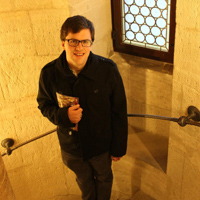
Clint’s work was also awarded the distinctive recognition of a Top Three Oral Presentation award at the 2015 Graduate Research Forum, held on October 30th at Miami University. As a top presentation recipient, he was given a professional expense award of $300.The History Department is delighted to see Clint’s work gain such well-deserved recognition.
History Goes Digital at Miami University
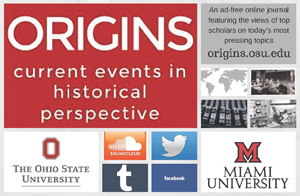 When Steven Conn joined the department this fall to teach modern American history after twenty years teaching at Ohio State University he brought with him a project he has been working on for 8 years: Origins: Current Events in Historical Perspective. Origins is an on-line monthly features magazine that brings historical expertise to the wider public. Each month Origins publishes a main article written by a specialist on that topic, a book review written by one of our graduate students, a “Milestones” essay, a round-table discussion on the “History Talk” podcast and other tidbits as well. The December issue marks the 100th edition of Origins and it is now read by roughly 50,000 people from around the globe every month.
When Steven Conn joined the department this fall to teach modern American history after twenty years teaching at Ohio State University he brought with him a project he has been working on for 8 years: Origins: Current Events in Historical Perspective. Origins is an on-line monthly features magazine that brings historical expertise to the wider public. Each month Origins publishes a main article written by a specialist on that topic, a book review written by one of our graduate students, a “Milestones” essay, a round-table discussion on the “History Talk” podcast and other tidbits as well. The December issue marks the 100th edition of Origins and it is now read by roughly 50,000 people from around the globe every month.
In those 100 issues Origins has covered the globe: it has featured articles on the water crisis in Australia and the history of international adoption; we have asked why Americans remain so resistant to Darwinian biology and examined the long history of tensions between Russia and Ukraine. In fact, the most widely read article explored the history of fights over water rights in the Nile River Valley, which went viral in Ethiopia. Origins articles have been used in classes all over the world, but translated in a number of languages including Georgian, French, Indonesian and Amharic. Origins articles have been used by the State Department, the Department of Defense, The Robert Wood Johnson Foundation among other organizations.
The goal of Origins is bring the insights and understanding that historians have about our world to a broad public. It takes up Toni Morrison’s challenge when she wrote: “For insight into the complicated and complicating events . . . one needs perspective, not attitudes; context, not anecdotes; analyses, not postures. For any kind of lasting illumination the focus must be on the history routinely ignored or played down or unknown.” When you have a moment, check it out at origins.osu.edu.
Tales from the Archive
A History Graduate Student and his Sources
M.A. student Trevor Israelsen discusses his approach to archival sources at the Cincinnati Children’s Hospital, and how research methodology can help to frame historical questions:
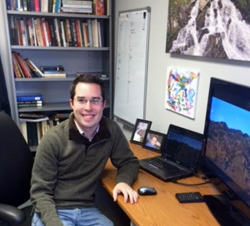 Many of those with whom I have worked with here in the history master’s program at Miami will probably agree that change has been important to my graduate experience for the last year and a half. Many of the changes I have initiated in my research have related to my career decisions, however, I am coming to appreciate change as an integral part of a research process with which many of you are so familiar. Amanda McVety, Wietse de Boer, Matthew Gordon and many others have helped me and my colleagues in the master’s program recognize that the adaptation of research questions, research plans, and historical arguments vis-à-vis historical evidence is essential to historical methodology.
Many of those with whom I have worked with here in the history master’s program at Miami will probably agree that change has been important to my graduate experience for the last year and a half. Many of the changes I have initiated in my research have related to my career decisions, however, I am coming to appreciate change as an integral part of a research process with which many of you are so familiar. Amanda McVety, Wietse de Boer, Matthew Gordon and many others have helped me and my colleagues in the master’s program recognize that the adaptation of research questions, research plans, and historical arguments vis-à-vis historical evidence is essential to historical methodology.
Last spring I approached Amanda McVety with an observation about the children’s hospitals—they spread throughout the United States before the professionalization of pediatrics during an era in which childhood itself was becoming culturally significant to many Americans. After making several visits to an archive at the Cincinnati Children’s Hospital and reading into various monographs about the cultural history of childhood I determined that I would write an article in which I would make connections between ideas about childhood and the history of the Cincinnati Children’s Hospital. In the spring I wrote a prospectus in which I hypothesized “that early children’s hospitals were perceived as a stage of child-welfare reform which was able to reconcile the nineteenth-century confidence in institutions with Progressive conceptions of modern childhood.”
As I read through the hospital’s annual reports during the summer I came to find problems with my hypothesis, not because I thought it was wrong, but because I was trying to make a claim for which I did not have the right kind of evidence. In September I changed my prospectus, hypothesizing that “the hospital was able to grow from a small religious and humanitarian venture into a vanguard medical organization because it adapted its core mission relative to evolving definitions of child welfare and medicine.” This new idea was something I thought that I could support given the source base I was working with.
I began a more systematic exploration of the hospital’s annual reports. A friend had recommended that I try a qualitative data analysis program called NVivo to “code” my information according to specific research themes; that is, I used this software to organize hundreds of quotes from the hospital’s annual reports thematically and chronologically. By the end of this process I was able to select a particular “node” such as welfare or funding and view the related quotes with their citations. Subsequently I organized these quotes into bare outlines which allowed me to view when particular topics were discussed over time. Ultimately this process helped me to make decisions about how to periodize the hospital’s history and made it easier for me to build an outline for the article.
After typing up much of the outline I have come to realize that my hypothesis required reevaluation given what I have learned from working with the historical evidence. It now seems that I can account for many of the changes I have perceived in the hospital with concrete historical factors including epidemics and conflict between female administrators and male physicians. While changing discourse about child welfare and health still seems to figure into the narrative, my current hypothesis is that evolving definitions of welfare and health reflected (rather than effectuated) organizational change. In the end, one of the biggest lessons I have learned from this research project is that change, flexibility, and willingness to ‘listen to’ historical evidence are essential aspects of historical inquiry.
Opportunities to Contribute
Many history faculty members have contributed to, and benefitted from, the rich intellectual opportunities provided by Miami University’s Humanities Center, since its foundation in 2009 by Distinguished Professor of History Allan Winkler. The Humanities Center recently won a prestigious $500,000 Challenge Grant from the National Endowment for the Humanities. In order to secure this funding, the university must raise $1.5 million over the next five years.
This funding will put Miami University at the forefront of interdisciplinary humanities education, transforming the way humanities research is conducted and setting a new standard for undergraduate programs.
Miami’s Humanities Center supports the study of the humanities by:
- Fostering collaborations of faculty, students, and experts to tackle complex social issues
- Promoting a rigorous liberal arts education for all Miami students
- Cultivating undergraduate research opportunities in the humanities
- Recruiting, retaining, and supporting outstanding faculty
In making its award, the NEH called the Humanities Center “a model” for undergraduate programming, and a recent external review said the Center’s existing programs are “among the best imagined, designed, and run … in the world.”
Please contribute to this important campaign and learn more about Miami's Humanities Center.
History Faculty Publications and Achievements
Elena Jackson Albarrán
- “El niño proletario: Jesús Sansón Flores and the New Revolutionary Redeemer, 1935-1938,” in Mexico in Verse: A History of Music, Rhyme, and Power, eds. Stephen Neufeld and Michael Matthews. Tucson: University of Arizona Press, 2015. pp. 218-256.
- “Boy Scouts under the Aztec Sun: Mexican Youth and the Transnational Construction of Identity, 1917-40” in Transnational Histories of Youth in the Twentieth Century, eds. Richard Ivan Jobs and David M. Pomfret, Palgrave Macmillan, 2015. Pp. 45-69.
Renée Baernstein
- January 2015 became Associate Dean of the College of Arts and Sciences.
- Winner (with John Christopoulos) of the 2014 Prize for Best Article on Women and Gender in Early Modern Europe, from the Society for the Study of Early Modern Women for their article, “Interpreting the Body in Early Modern Italy: Pregnancy, Abortion and Adulthood,” Past and Present, 223 (2014), 41-75.
Tammy Brown
- City of Islands: Caribbean Intellectuals in New York, University Press of Mississippi, 2015.
Nishani Frazier
- PREP award for costs associated with book project, Harambee City.
Matthew Gordon
- Officer: President, Middle East Medievalists, three-year term, 2013-15.
Erik Jensen
- Award: Miami University Student Affairs, Excellence in Career Development Award for work on the HumanitiesWorks project and for developing career advising in the history major, 2015.
Amanda McVety
- "JFK and Modernization Theory" in The Cambridge Companion to John F. Kennedy (Cambridge, 2015)
Andrew Offenburger
- “Cultural Imperialism and the Romanticized Frontier: From South Africa and Great Britain to New Mexico’s Mesilla Valley,” Amerikastudien / American Studies 59, no. 4, 2014.
- “Outlanders and Inlanders: Boer Immigration to the U.S.-Mexican Borderlands, 1902-1905” in Brian Cannon and Jessie Embry, eds., Immigrants in the Far West: Historical Identities and Experiences, University of Utah Press, 2015
Yihong Pan
- “Never a Man’s War: The Self-Reflections of the Women Soldiers of the New Fourth Army in the Resistance War against Japan (1937-45).” (in Chinese) Research on Women in Modern Chinese History, issue 24 (December 2014), pp. 83-131.
- Presented a conference paper, “Everyday Experiences and Resistance: Analysis of Oral Narratives by Middle Class Women in the Occupied China under the Japanese Aggression.” at the American Historians Association’s 2015 annual meeting on January 2, 2015.
- Authored two book reviews, to appear China Review International published by the University of Hawaii Press, 2015: Helena K. Rene. China’s Sent-down Generation: Public Administration and the Legacies of Mao’s Rustication Program. Washington, DC: Georgetown University Press, 2013. xvii, 229 pp. Paper back. ISBN 978-1-58901-987-4; and Michel Bonnin. The Lost Generation: The Rustication of China’s Educated Youth (1968-1980). Translated by Krystyna Horko. Hong Kong: The Chinese University Press, 2013. xv, 515 pp. Hard cover. ISBN: 978-962-481-8.
Lindsay Schakenbach Regele
- Will be on fellowship at the Library Company in Philadelphia for the Spring 2016 semester.
Marguerite Shaffer
- “A Transnational Wildlife Drama: Dian Fossey, Popular Environmentalism, and the Origins of Gorilla Tourism,” American Quarterly, Vol. 67, No. 2 (June 2015): 317-352.
- Rendering Nature: Animals, Bodies, Places, Politics, contributor and editor with Phoebe S. K. Young, University of Pennsylvania Press, 2015.
- “Digit’s Legacy: Reconsidering the Human-Nature Encounter in a Global World,” Rendering Nature: Animals, Bodies, Places, Politics, eds. Marguerite S. Shaffer and Phoebe S. K. Young, (University of Pennsylvania Press, 2015), pp. 70-96.
- Co-authored with Phoebe S. K. Young, ““The Nature-Culture Paradox,” Rendering Nature: Animals, Bodies, Places, Politics, eds. Marguerite S. Shaffer and Phoebe S. K. Young, (University of Pennsylvania Press, 2015), pp. 1-20.
Helen Sheumaker
- "All Downhill from Here: Teaching with Drunk History," Perspectives on Teaching: The Newsmagazine of the American Historical Association, October 2015.



